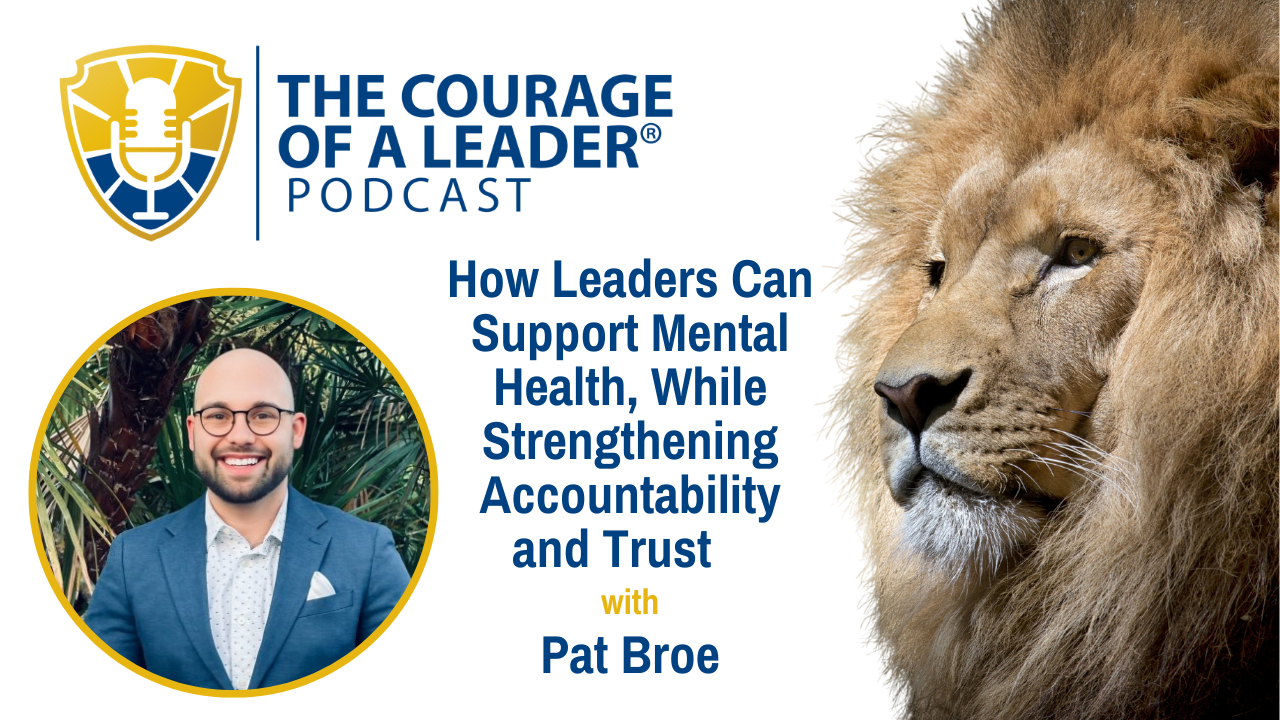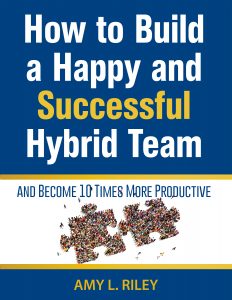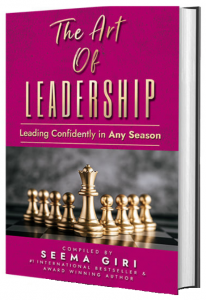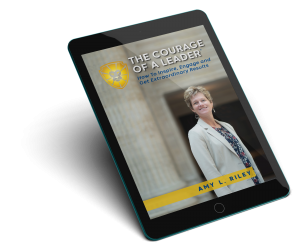Pat Broe, best-selling author and mental health advocate, shares insights on how leaders can support their teams’ mental health while fostering trust and accountability. He emphasizes the importance of open communication, empathetic leadership, and creating safe spaces where employees feel comfortable sharing challenges. Pat also highlights the need for leaders to prioritize their own mental health through self-awareness and reflection. By leading with authenticity, compassion, and clear expectations, we can build stronger, more resilient teams that thrive even in difficult times.
Highlights
- Empathy in Action: Discover how balancing empathy with accountability strengthens trust and team performance.
- The Power of Check-Ins: Learn how intentional, regular conversations can uncover hidden struggles and foster connection.
- Lead with Authenticity: Explore how being open about your own challenges as a leader can inspire greater team loyalty.
- Support Over Assumption: Find out why asking team members what they need is more effective than making assumptions.
- Self-Check for Leaders: Understand the importance of reflecting on your own strengths, challenges, and mental health to lead effectively.
Resources Mentioned
The Inspire Your Team to Greatness assessment (the Courage Assessment)
How can you inspire our team to be more proactive, take ownership and get more done?
You demonstrate and empower The Courage of a Leader. In my nearly 3 decades of work with leaders, I’ve discovered the 11 things that leaders do – even very well-intentioned leaders do – that kill productivity.
In less than 10 minutes, find out where you’re empowering and inadvertently kills productivity, and get a custom report that will tell you step by step what you need to have your team get more done.
https://www.courageofaleader.com/inspireyourteam/
About the Guest:
Pat Broe is a best selling author, mental health advocate, and sales and marketing professional. His journey to professional success was marked by personal struggles with anxiety, depression, and an attempt on his own life. These challenges ignited his passion for guiding others toward authentic living.
With raw storytelling and practical advice, Pat empowers readers to overcome the unique mental health threats of modern life. Drawing from his diverse background spanning radio hosting to business consulting, he offers a powerful roadmap for cultivating a happier, more fulfilling existence as “The Real Confident You.”
https://www.linkedin.com/in/patrick-broe/
About the Host:
Amy L. Riley is an internationally renowned speaker, author and consultant. She has over 2 decades of experience developing leaders at all levels. Her clients include Cisco Systems, Deloitte and Barclays.
As a trusted leadership coach and consultant, Amy has worked with hundreds of leaders one-on-one, and thousands more as part of a group, to fully step into their leadership, create amazing teams and achieve extraordinary results.
Amy’s most popular keynote speeches are:
- The Courage of a Leader: The Power of a Leadership Legacy
- The Courage of a Leader: Create a Competitive Advantage with Sustainable, Results-Producing Cross-System Collaboration
- The Courage of a Leader: Accelerate Trust with Your Team, Customers and Community
- The Courage of a Leader: How to Build a Happy and Successful Hybrid Team
Her new book is a #1 international best-seller and is entitled, The Courage of a Leader: How to Inspire, Engage and Get Extraordinary Results.
https://www.courageofaleader.com
https://www.linkedin.com/in/amyshoopriley
Thanks for listening!
Thanks so much for listening to our podcast! If you enjoyed this episode and think that others could benefit from listening, please share it using the social media buttons on this page.
Do you have some feedback or questions about this episode? Leave a comment in the section below!
Subscribe to the podcast
If you would like to get automatic updates of new podcast episodes, you can subscribe to the podcast on Apple Podcasts or Stitcher. You can also subscribe in your favorite podcast app.
Leave us an Apple Podcasts review
Ratings and reviews from our listeners are extremely valuable to us and greatly appreciated. They help our podcast rank higher on Apple Podcasts, which exposes our show to more awesome listeners like you. If you have a minute, please leave an honest review on Apple Podcasts.
Teaser for Next Episode
Our next episode, The Productivity Secret: Aligning Where You Work with What You Do, will finally be a solo episode from Amy Riley, in which she’ll reveal how the key to productivity lies in matching your environment to the task at hand. From collaboration to deep focus, discover how leaders can create spaces that empower their teams to thrive. Don’t miss it—it might just change the way you think about where and how you work!
Transcript
Pat Broe is a best selling author, mental health advocate and suicide survivor. Pat joins us on the Courage of a Leader podcast today to guide leaders on how to support themselves and their team with their mental well being. You will enjoy how Pat approaches what can feel like a tricky and sensitive topic with candor, real examples and practical advice. I'm glad you're here to listen.
Amy Riley:Welcome to the Courage of a Leader podcast. This is where you hear real life stories of top leaders achieving extraordinary results, and you get practical advice and techniques you can immediately apply for your own success. This is where you will get inspired and take bold, courageous action. I'm so glad you can join us. I'm your host. Amy Riley, now are you ready to step into the full power of your leadership and achieve the results you care about most? Let's ignite the Courage of a Leader.
Amy Riley:Pat, thank you for being here on the Courage of a Leader podcast with me today. Amy,
Pat Broe:I'm very excited to be here today. Yes, I
Amy Riley:appreciate you in this conversation that we are going to have mental health issues anxiety, they're on the rise, and if we as employees, team members are grappling with stuff, then we're grappling with stuff while we're working, and our work environment, our work relationships, our leader can add to the problem or can be a support. So we wanted to talk about, how can leaders support their team's mental health. Pat, where would you start with your guidance?
Pat Broe:out of the CDC, even back in:Amy Riley:into. Yeah, I'm hearing it's here. It's real. Yeah, the workforce is different. I mean, Pat, I can't tell you how many leaders, how many colleagues, how many people I've had say to me, this has been a really hard year, and they might have said it this year. They might have said it last year. They might have said it the year before, right? There is tough stuff that people are dealing with, so it's easy for leaders to think, well, that's not my job, right? It's not my job to go there to support people's mental health. I'm not a therapist, or it's going to be too personal or invasive, or I might cause more upset if I try to open up conversations around this. What would you say in response to those kinds of thoughts
Pat Broe:well, and I think it comes from the correct place, right? You know, as a leader, you don't want to be the type of person that can be pushed over, right? You don't want to be the type of person where someone can come to you and say, my grandma died seven times in one year and take seven weeks off, right? You don't want to create that kind of an environment. So how do you create that delicate balance of, how can I be an empathetic person and see these people as they are without actually giving up some sort of of credibility that I have as a leader? And what I would say is, for any leader, is if someone you're leading doesn't feel comfortable enough to have a conversation with you about. About their life. Are you a leader or are you just a manager that someone's punching a clock for? Because leaders are people that actually lead people to be beyond what they could be without you, and that is such an important role of who they are. And it might not be specific mental health issues, but grief or challenges that they're having in their own life, upside down on their mortgage, whatever it is, people have so many stresses going in to their to their day life, and it's your job to get the best out of them that they possibly can, and not acknowledging those things is causing a detriment to your team and your ability to lead correctly. Yeah,
Amy Riley:a couple of important distinctions I heard in what you just said. Pat there. First of all, how can we be the empathic leader who still holds people accountable and is creating that kind of environment. And then also, do you want to be a leader, or do you want to be a manager? Right? And a leader is working with folks about, how do we create the conditions for success for you to achieve here and get your work done. Well,
Pat Broe:yeah, and I think on top of that as well, there's great leaders. Have an ability to find more out of people than they even believe they had in themselves, right? I'm really obsessed with Nick Saban at the moment because he's retired, and now he's the former head coach at Alabama, because he's retired, and now he's actually speaking without a media lens to really hear what his thoughts on leadership are. And this is a guy who is old school and hard on his kids, you know. And these are college kids with all the pressure on the world on them, but all you hear from these players is how much he loved them and how much he was involved in their personal lives and their families, and he got to know their parents and the intimacies of what was going on in their personal life, and that was part of the sales pitch of getting these kids to come to Alabama. And so you can play that balance of, hey, when someone needs coaching, they need coaching. And I would say, too, I've always and I wonder if you feel the same way as well someone who personally cares about me a hard coaching note comes much easier that way. And I'm more inclined to listen to it, because I know that this person has my best intention at heart. They want to see where my career is going. They want to see the goals that I have for myself and my family come through because they care about who I am as a human being and so as a leader, it is your role. And you don't have to be best friends with these people, but you certainly need to show that you care. Yes,
Amy Riley:Pat, I talk often about leaders will come to me, Oh, I have a difficult message to deliver. How do I say it? What do I do? And they're looking for those mechanics, and I often steer them in another direction. What are your beliefs? What are your intentions? What do you want for this person, this relationship, this conversation, and when, like you said, we can feel those good intentions from those around us. And we've all probably had the experience where someone seemingly said and did everything exactly right, but we're like, don't quite buy it. Or we knew that they had our back. We knew that they were on our side, and then we forgive them, not quite saying it right or okay, but I know where she's coming from
Pat Broe:exactly 100% and it's funny how, as a leader, we're no different than like a teacher in a classroom with kids, and kids truly understand what a teacher you remember as a kid when your teacher was honest or not honest, and your employees, or the people working for you, or the people that you're leading, they know your intentions when you're saying what you're saying. So if being honest and upfront about what you have to say and what the intention is, it gives you a world of clearance of messing up and saying the wrong thing, because it's never the wrong thing if it's the right tension. Great,
Amy Riley:Pat. I want to get more into the how tos, and I think we're starting there with what's most important, being honest, being upfront, stating our intentions, being clear about our intentions. Before I ask my next question, I want to tell listeners a little bit more about you and why you are here having this conversation. Pat Broe is a best selling author, mental health advocate and sales and marketing professional. His journey to professional success was marked by personal struggles with anxiety, depression and an attempt on his own life. These challenges ignited his passion for guiding others towards authentic living with raw storytelling and practical advice. Pat empowers readers to overcome the unique mental health threats of modern life, drawing from his diverse background, spanning radio hosting to business consulting, he offers a powerful roadmap for cultivating a happier, more fulfilling existence as the real confident you. The book is called The Real Confident You; Advice From a 20 Something Suicide Survivor. Thank you for getting your messaging out there. Pat, I know this is a side gig and a passion of yours. Yes, and I appreciate your time with us today.
Pat Broe:I'm so happy to be here. Yeah, it might be a side gig, but it is. It's what brings joy to my life. And every single day, I get to have cool conversations like this that are really reaching people and helping people's lives. So what else would you want to live for? Truly, that's great. Appreciate
Amy Riley:it and love it. It's so important because, you know, as we've said, mental health issues are on the rise. It's those conversations are coming more into our mainstream, but there's a lot more work to be done here. So if I'm a team leader, Pat and I've never really had these kinds of conversations with folks, but I suspect so and so on my team is not feeling and doing so great right now. What do I do?
Pat Broe:Yeah, I would say, I think you need to prepare yourself before that time even comes. In your one on ones, in any conversations that you're having, carving out space where you're asking people about what's going on in their lives, whether it's the end of a one on one, whatever it is and that's and that could be career performance goals, that could be personal performance goals, and that individual that you're talking with is going to have different kinds of aptitudes to want to talk about that kind of stuff with you. Unfortunately, empathy has no KPI, so it's pretty hard to measure that, being said, carving out that space and being intentional with every conversation that you have, of checking in on where they are as a human being, creates that trust, and they're more likely to just come to you in that scenario than you having to go to them that all being said. Wanting to start that conversation. Number one is try not to be accusatory as much as possible. If you really think someone is going through something in their personal life or something is different. Really try to come into that conversation with an understanding of how you would want to be approached in that scenario. We've all been through things in our lives. We've all had downturns. It's part of existence, right? We've all experienced grief for pain or whatever it is. So if someone has something going on in their life and you suspect that's happening, let's say they're the highest performing person on their team, and now all of a sudden, they come back for lunch and they're 40% of what they typically are every day. And you don't know why, intentionally starting that conversation in a one on one and simply asking them about what's going on in their life, if you've already created that fight environment, or even if you haven't, people are going to tell you what's going on in their life. And if you press in an empathetic way, typically those things come
Amy Riley:out nice Pat. I'm hearing first of all, ask some open up ended questions in your one on ones. How are you doing? How is work fitting into your life? How's this going? What are your professional goals? What are your life goals? How does work fit into that? And then I'm hearing we might not be dealing with what our team member is dealing with, or what we suspect they're dealing with, but we've dealt with something, yeah, life. How would we have wanted to be approached in that time in our life and draw on that right? That can be a starting point. And then they'll respond however they're going to respond, and then we can adjust,
Pat Broe:right? And if you know this person, if you've been intentional about curating some sort of relationship with them, it should be natural to have a conversation. But even if you haven't, I think we undervalue our ability to talk about what's going on in our lives with other people. But there's the whole cottage industry is built around teaching people how to talk to other people, and we do it inherently. We know it about each other. We know how to be empathetic. We know when someone's been going through something, and also you're going to be able to sniff out when that isn't authentic, when whatever they're quote, unquote, going through isn't something right when grandma did die the seventh time this year, and they're asking for time off, and it's not something actual going on, and maybe they're looking for work somewhere else, or whatever it is, you'll be able to send that out. And if anything, having these conversations gives you the ability to see those things months down the road before they come, right before a key team for leader leaves, or before you know someone's performance gifts, because they just don't care anymore. You can see these things coming quicker when you're more empathetic and you're really in touch with what's going on in your team.
Amy Riley:So I'm also hearing just be tuned in, be noticing and approach the conversation like you would with your brother or with your close friend. Yeah, and I think part of the answer here, Pat is that we need to find our genuine, authentic way. So yes, the best way for me to approach this is to think about, how would I do this 100% with a close friend and but I'm imagining like, if someone's really struggling to find the words, it can be anything right, just be like, I care about you, and I've noticed something different completely. I'm here for conversations. Do you want to talk about what's going on with you? Do you have any guidance for that conversation opener?
Pat Broe:Yeah, I would say the number one way you could start a conversation with anybody about anything that's going on in their life is simply, how are you and what? And I say that because whatever the answer to that is. Just ask it. Follow up with, why, if it's good, why, if it's bad, why say more and Exactly? And I would say, treat the conversation like a third grader until you get the answer that you want. Why? What? How, as many times as you can, until you get some sort of answer that has substance. The small, short answers like my sales career, they've been the greatest thing on planet Earth, why, what and how have won me more deals than I can imagine on planet earth? Because people will just eventually start telling you things that they didn't even realize they wanted to talk about. And so if you from a sincere place, not You're not prying, but you're just really want to understand what's going on in this person's life, continue to ask small, short, open ended questions. They'll tell you what's going on.
Amy Riley:I like it. You're reminding me, Pat there was a leadership development program. We had a year long program with leaders, and we had pretty frequent touch bases. It was a really luxurious program, from my point of view. And we had time we checked in leaders, and we always asked, How are you really that really question, and I love your guidance about keep asking and keep asking like a third grader
Pat Broe:as much as you can. It opens up, yeah, just bring empathy. Be open ended. Ask as many questions as you possibly can. Lovely.
Amy Riley:Now pat. I think some leaders can be hesitant, because they might think, yeah, I can open up this conversation, but then where is it going to go, and what will I say if we open it up? And now someone's talking about extremely high levels of anxiety. They're talking about self harm. Thoughts. What do you suggest leader might be getting panicked right
Pat Broe:now? We're down an HR nightmare kind of conversation? Yeah, I would say number one before you walk into any of those conversations, I would look into the resources your organization already has on hand. I would also say, be prepared to come up with a game plan with that person on the spot of whatever it is. I mean, if a if they're expressing interest of self harm, I would say immediately, I would talk to authorities. If it's that serious, get those kind of necessary resources on board. But if it's levels of depression or things going on. Be the empathetic person to say, okay, how can we help find you? Help try to share stories of when you've been down. The worst thing a depressed person can hear is, I'm sorry I didn't know. Is the worst phrase you could possibly use. You want to not put guilt on the person that's sharing this with you. They don't want to make you feel bad. And so being the person that says, Hey, I've been there, or hey, I maybe I haven't been there, but I'm here to help. You know, let's be strong together, is going to do so much more wonders for that person right? Collapsing under the weight of their depression is not going to make them less depressed. Got it? You need to. You have to be the strong one in the conversation. They're looking for rocks. They're looking for a limb on the tree to grab and pull up. They're desperately looking for it be the limb. Don't come down on the ground with them.
Amy Riley:This is helpful to hear. So not the I'm sorry I didn't know. Like, you didn't tell me or but also like, we could share stories. Like, yeah, I'm haven't been in your shoes. I've and I've struggled. Yeah, I've struggled co create, right what would be supportive right now? So I'm thinking like, also maybe be go in knowing what you're willing to do if there's an urgent deadline and a project coming up, is there another resource you can bring in there, like, kind of knowing what's the range of possible support, completely, mechanisms you can put into play? And
Pat Broe:that was the third thing that I was going to touch on, is, okay, then really control what you can control. What do you have organizationally, in terms of what their workload is, what are you guys working on together that you can potentially change? And maybe their answer is, I actually find a lot of solace in my work. I really enjoy doing it. Don't take anything off my plate. This is the only thing keeping me sane. Then don't take anything off their plate. Don't go to assumptions. Ask them, hey, what can we do here at work to create a better environment for you, whatever that is, because for me, I thankfully passed a lot of this stuff. But I know if I was experiencing pretty severe anxiety and depression, I would want to work 60 hours. Because the only thing that keeps me saying, Gosh darn it, and there's, and I'm sure there's a lot of Type A's on your team that are just like that, who might be experiencing things, and hey, I can control what's going on at work. I can control my output. I might get tired or whatever, but like creating that open line of communication to say, Hey, this is this is really important to me. I love this. Let me keep doing this is great, or it's Hey, I you know, I need to start seeing a therapist or whatever it is. I'm going to start clearing time on my calendar to do that. Being empathetic. That's something that this person needs to do. Yeah.
Amy Riley:I have struggled with grief Pat and I know that structure, right, routines, rituals, are really supportive in those moments. Okay, so I'm hearing do some of our homework, right? Know what resources are available? Know what kind of is the range of support we might be able and willing to provide in the work circumstances. But then you show up and you're present, and you're asking questions, and you're letting them guide where it's going and CO create from there. That's exactly it. That's exactly it. Not come in with, I assume they're going to need this, and I'm going to offer this and that,
Pat Broe:yeah, don't come out with your 90 day sko you know, here's our service kickoff of how we're going to make you feel better. Come in with, keep the deck blank. Know your resources, but come in prepared. That conversation can go in many different ways, and it could just be. And, you know, be prepared too, that it could just be, hey, my dog died. It's a bad couple days. I'm going to be okay, but just know that these couple days are going to be rough for me, and that's okay too. And a dog dying stinks. So someone should have three days to Hey, grieve a little bit.
Amy Riley:Yeah, it might just be so helpful for them to hear that sucks. Yes. Terrible.
Pat Broe:Exactly, exactly. Hey, Mike, yeah, hey, my car broke down this week. I've been Uber into work every day. I don't know how to pick up the kids from school. Sometimes life just happens. Sometimes it's not as serious as big mental health challenges are coming. And even still, having that muscle built already helps those conversations go easier too. Yeah,
Amy Riley:so it could be just be ready and willing to listen and be with the emotions, the thoughts, whatever's going on for that other person. I think sometimes, as as leaders, we're so programmed to fix yes and figure out, okay, well, what does this look like? What are we going to do about it? And there might just be nothing to do. Yeah, about it. Hey, it's
Pat Broe:going to take me a second to be holding it. I mean, you talked about grief. Grief is one of those where it just takes time. But yeah, and grief is a heart is one that people have a really hard time empathizing with, that they haven't gone through, right? Because it's such a unique experience, especially if it's a big grief, right, like an immediate family member or whatever. And so, okay, you need space for a couple weeks. Completely understood, yeah, well,
Amy Riley:yeah, and then, and there's these waves, right? So, Pat, we're, we're recording this in December. My father passed away a decade ago. Yeah, I still, still in December, right? So people might not have any awareness that could be going on for me. And, you know, I worry that others are going to judge that, right? Like, why is that still there for you? I don't know it is. No, I've
Unknown:thrown a bunch of ideas at it still here, right? So, and it
Pat Broe:could be the goofiest thing that pulls it out, right? Like, my grandfather basically helped raise me. He lived right down the road for me. When we were living in Colorado, I would consider him probably my best friend in life, and we lost him almost 10 years ago now. And It's little things like, if I hear Willie Nelson, I want to cry, and it's been 10 years, you know, and I love Willie Nelson, but if I hear hey buddy by will or Hello walls, I'm going to lose it, you know, like, I'm going to be walking down the street and losing it triggers, yeah and yeah and so as a leader, you have those things going on too, so don't be surprised when it happens to your to your team members. Yeah,
Amy Riley:I'm also thinking to put into this conversation Pat like, just let your humanity be there, like you might stumble over your words. I mean, you might actually say, I'm not sure of the best things to say in this moment. I want you to know that I care. I'm willing to listen, and
Pat Broe:people will love that, and people will love you for it, and want to work much harder for you because of it. And I think too, as a leader, we all want to seem kind of infallible, right? We want to seem like the the knight in shining armor. But when you're going through things in your life, you know, when your dog dies, when you're having a rough day, share that with your team, right? Hey, guys, just want to let you know I'm going to be a little bit late the next couple days. Kids home, homesick, wife struggling with it. I'm gonna try to be best I can, but I might not be 100% today. If your team knows that you're like that and you're willing to share that kind of stuff with them, you've reached the golden ticket,
Amy Riley:and you want the information from your team, right? Regardless of whether you know about it or not, they're still dealing with it over there. And then if you can know, then you can be the supportive person. And then you can also make the arrangements to make sure that the work is handled exactly as best as possible,
Pat Broe:exactly, yeah. And then you it's not three months down the road, this person who could have been your model employee, is now on a pip because they. Had no idea how to figure out the work life balance, whatever was going on in their life. Meanwhile, in that three months, you guys could have figured out some sort of plan, and they could be your model employee. And so you're missing out on opportunities to have people that could really change your organization and you as a leader by not listening to and hearing them out.
Amy Riley:Pat, is there a message here that's important for leaders to hear. I think another thing that can hold us back is if there's mental health issues there now, like they're always going to be there. Now, it's just like a trouble train, yeah, that we're on together, but you're speaking to Hey, could have gotten this support, and now they could be your model employee, right? Simone Biles can deal with mental executes and then come back and win all the medals. Yeah,
Pat Broe:exactly, exactly. Or, then there's numerous examples of that, right? I think my own life is not nearly to that level, but like an example of that for myself, right? That people go through things and then on the other end of it, can end of it, can find success and happiness and everything. So what I would say is, and I think it all gets back to the point of leaders don't want to be taken advantage of, right? They don't want to now have a problem, right? This person now becomes a problem. Oh my gosh, I always have to deal with John's anxiety. I'm hearing about John, you know, you're at the dinner table every night talking about John's anxiety and how you're going to deal with it at work. What I will say is, if you have those open and honest conversations with people, they're going to be less inclined to make it a problem, because they know that you care, and people don't like to burden other people almost ever, and if, especially people they think actually give a genuine interest in them. If they think you're the kind of leader that's going to screw them over, or just cares about them as a cog in the wheel, they are happy to screw you over, I promise you that. But if you if they know that you care about them, they're not going to want to do that, and they're going to want to work harder for you. And so you're creating an environment in which you have a group of people dealing with all spectrums of problems in their own life who now want to work harder for you. So I think what we think is going to be the problem ends up being the opposite right now, if it's gets to the point where, and I'm just using fictitious John and his anxiety in this example, where he has to go to HR for something, or whatever it is, and not talk to you, then you might have a John problem, right? Because John doesn't trust you to deal with these problems. So he's going to work around or he's going to find another leader who's going to care, or he's going to find another organization that does your church bake sale is not supporting him. So he's going to find the church bake sale down the street that he can go work for, that he feels supported.
Amy Riley:That's a great point. Pat. What is one thing that you would recommend all leaders do today this week, to be the leader that supports their team's mental health? I
Pat Broe:would say the first thing that you can do today is on the agendas of your one on ones, or whatever conversations you're having with someone work in a nugget of how they are doing in their lives. Learn something about your employees today. Be curious about who they are as a person. Be as a person today, and I'll drop a second one, which is, check in on yourself too. We've made this conversation a lot about the downstream and how you're leading people, which is incredibly important, and we need leaders who are that way, but check on yourself too. You make a I'm sure you've made a SWOT analysis of your organization 10 times as a leader. How about you make one of yourself check in. What are my strengths and weaknesses right now in terms of what's going on in my life. What are my opportunities? What are my threats? Am I feeling gracious for things? Am I happy all of those things? Check in with you for just a moment and see where you're at, and if there's things that you can improve on, be vocal about those two to whoever is leading you.
Amy Riley:Great advice. Pat, I love that we do the SWAT on the project or the organization. Do it on ourselves and check in regularly.
Pat Broe:Shift completely. Yeah, you can burn out. Happens quick. Could be three weeks of 80 hour weeks, and then all of a sudden that happy go lucky job turns into your nightmare. So check in as much as possible and create times that are calendarized and intentional about check ins with you. Yeah,
Amy Riley:make it very planful, checking in with themselves, checking in with the team. Pat, thank you for the very practical guidance today on this important topic. Amy,
Pat Broe:I really appreciate you being open to having this conversation. It was great conversation today. Thank you.
Amy Riley:Thank you for listening to the Courage of aLleader podcast. If you'd like to further explore this episode's topic, please reach out to me through the Courage of a Leader website @ www.courageofaleader.com I'd love to hear from you. Please take the time to leave a review on. And iTunes that helps us expand our reach and get more people fully stepping into their leadership potential. Until next time, be bold and be brave, because you've got the Courage of a Leader. You.



 A Summary of The Courage of a Leader® 4 Pillars
A Summary of The Courage of a Leader® 4 Pillars




